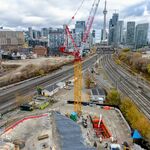It is grossly unfair to have tolls entering the city.
Why should someone driving their small, fuel efficient, low polluting vehicle who drives just a couple of km from Miss to Sherway Gardens pay a toll but someone driving their Hummer from Miminco to Malvern do so free of charge?
Gas taxes are the only regional option and they cost almost nothing to collect and administer.
Gas taxes raised by Metrolinx for mass transportation infrastructure is the only sane option.
Ssiguy2, as has been pointed out, I think the idea behind congestion fees is to control demand (car use) of a fixed product (roadway). So, in your example, the person driving just a couple of kilometres from from Mississauga into to Sherway Gardens would be tolled because the demand for that particular roadway exceeds its supply. The person driving from Mimico to Malvern would not because the route they take is not overwhelmed by demand. But you're right, in terms of environmental/roadway repair cost - the Hummer is no doubt causing more damage. Gas+fuel oil derivative/additive taxes, taxes on car parts, taxes on tires, a tax on the number of kilometres driven between plate renewals could all go towards moving some people into more reliable, fuel-efficient, lower-impact vehicles, encourage some people to look for work closer to home (or move closer to work), and encourage others still to opt onto transit where possible. To keep going with your rather apt example, that person driving 2 kilometres from Mississauga to Sherway Gardens really couldn't get on the bus or ride a bike/scooter in better weather?
Gas taxes, while administratively easy to collect, as a sole means to control
congestion would not work. It might very well accomplish the very thing you point out: people could simply switch to smaller, more fuel-efficient, low-polluting vehicles. So, instead of 1000 cars per hour (on a roadway designed for 750 cars per hour) that pollute, we would now have 1000 cars per hour (on a roadway designed for 750 cars per hour) that don't pollute quite so much. The issue of congestion (vehicle demand in excess of supply of roadway) still hasn't been addressed - we've simply moved people into lower-polluting vehicles that use less energy.
I think the challenge here is that, much like most things, there is no silver bullet that will solve the problem overnight, and all options are going to be unfair to one party or another. It's going to have to be a balance between the many things that have already been discussed here, subject to the vagaries of the the public/electoral process.
Gas taxes, vehicle registration fees, mileage/consumption fees, congestion fees, road tolls, increased parking fees, more mixing of employment and residential uses in the traditional suburbs (as opposed to the current modernist industrial park approach), dedicated transit routes/lanes, peak-hour transit that connects suburbs to suburbs and not just suburbs to downtown, etc will all have to be part of the mix. And in order to get any of that done, people are going to have to speak to their elected officials. Metrolinx can only do so much. Toronto's Mayor, among others across Ontario, have shelved transit plans in favour of (a) subways to nowhere to be financed by someone else, or (b) nothing.
Meanwhile, people need to get to whatever job that they are lucky to get, and more often than not, that means having to rely on the use of a personal vehicle for lack of choice. Who in their right mind would spend an extra 30-45 minutes each way on transit for principle when they can hop in a $4000 used corolla and get an extra hour of their lives back to deal with all the other things and be with family and friends?
There's some significant transit-related events coming up in the City of Toronto. Among them:
http://torontotalksmobilityforum.eventbrite.com/. Attend. Tell your co-workers to attend. Tell your friends to attend. Drag your family along. Otherwise, expect the status quo.
I live in downtown Toronto and bomb around in a v6. A resale vehicle that made sense at the time, but barely gets 350 km out of a full tank of gas. I am trying to use transit more often these days though it is a financial net zero and doesn't work for my job requirements. My rental insurance would be the same even if I dropped a vehicle from the policy, so by the time I've done gas tanks and oil changes maintenance upkeep parking fees etc etc I wind up having spent the same for a metropass as I have for the vehicle. But relying upon a metropass means adding an extra hour to three hours of travel to my day. I tried for a month - it wasn't worth it to me.I see limited ways for me to get out of not having a vehicle. The first is to find another job in my field that would allow me to get away without having a vehicle. I'm fortunate enough to be happy in my present position, so there's no real inducement to leave. Or there needs to be clear financial case for my to give up my vehicle the way things are priced, i.e. the cost to me really needs to get to a place where the loss in disposable income is far in excess of losing an extra hour to three hours out of my day depending upon my work demands.




